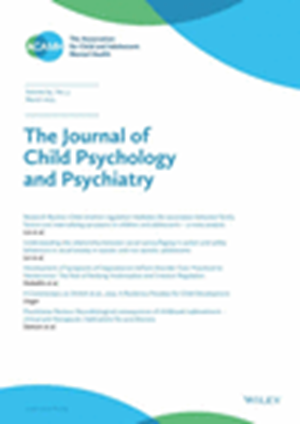Fostering positive mental health outcomes in vulnerable children: Pathways to resilience after preterm birth.
IF 7
1区 医学
Q1 PSYCHIATRY
引用次数: 0
Abstract
BACKGROUND Children born preterm (<37 weeks' gestation) are at increased risk of mental health problems, and their mental health outcomes have not improved in the past decades. This study aims to (1) determine the degree of mental health resilience in preterm-born children; (2) identify modifiable factors at individual, parent-child, family, peer group, and neighbourhood levels associated with resilience; (3) explore differential effects of factors based on sex and contextual adversity. METHODS Preterm-born children from the Bavarian Longitudinal Study (BLS; n = 574) born in Germany (1985-1986) and Millennium Cohort Study (MCS; n = 985) born in the UK (2000-2002) were assessed prospectively at 7 (MCS) or 8 (BLS) years. Resilience was defined as better-than-expected mental health outcomes, using a residuals approach. Potential promotive factors included (1) individual: self-regulation, perceived competence, cognition; (2) parent-child relationships; (3) family: home environment, interparental relationship, social support, sibling relationships; (4) peers: bullying, friendships; and (5) neighbourhood characteristics. Associations between promotive factors and resilience were tested using regression-based methods, with sex and contextual adversity (adverse life events, psychosocial stress, socioeconomic deprivation) as moderators and mediators. RESULTS The following factors were consistently (in both cohorts) associated with resilience: (1) individual: regulatory abilities, cognition; (2) parent-child: mother-child relationship; (3) family: authoritative and structured climate, interparental relationship; (4) peers: bullying. Regulatory abilities showed independent effect in both cohorts. Collectively, factors explained 30%-41% of the variance in resilience. Effects were similar across sex and contextual adversity, but promotive factors were less prevalent in boys and adverse contexts. Particularly in the UK, promotive resources were scarce amidst contextual adversity, which explained the lower resilience of children living in adversity. CONCLUSIONS This study identified modifiable factors such as child self-regulation, interparental relationships, and bullying that - if improved - have a high potential for improving mental health outcomes in preterm-born children.促进弱势儿童积极的心理健康结果:早产后恢复能力的途径。
背景:早产儿童(妊娠期<37周)出现心理健康问题的风险增加,而且在过去几十年中,他们的心理健康状况并没有得到改善。本研究旨在(1)确定早产儿心理健康弹性的程度;(2)在个体、亲子、家庭、同伴群体和邻里层面确定与心理弹性相关的可修改因素;(3)探讨基于性别和情境逆境因素的差异效应。方法:巴伐利亚纵向研究(BLS);n = 574)出生在德国(1985-1986)和千禧年队列研究(MCS;n = 985)出生在英国(2000-2002),在7岁(MCS)或8岁(BLS)时进行前瞻性评估。使用残差法,弹性被定义为好于预期的心理健康结果。潜在的促进因素包括:(1)个体:自我调节、感知能力、认知;(2)亲子关系;(3)家庭:家庭环境、亲子关系、社会支持、兄弟姐妹关系;(4)同伴:欺凌、友谊;(5)邻里特征。使用基于回归的方法测试了促进因素和恢复力之间的关联,性别和环境逆境(不良生活事件,社会心理压力,社会经济剥夺)作为调节和中介。结果与心理弹性相关的因素有:(1)个体:调节能力、认知能力;(2)亲子关系:母子关系;(3)家庭:权威和结构化的氛围,父母间的关系;(4)同伴:欺凌。调节能力在两个队列中都显示出独立的影响。总的来说,这些因素解释了30%-41%的弹性差异。性别和环境逆境的影响相似,但促进因素在男孩和不利环境中不那么普遍。特别是在英国,环境逆境中促进资源稀缺,这解释了生活在逆境中的儿童的低弹性。结论:本研究确定了可改变的因素,如儿童自我调节、父母间关系和欺凌,如果得到改善,将有很大的潜力改善早产儿的心理健康结果。
本文章由计算机程序翻译,如有差异,请以英文原文为准。
求助全文
约1分钟内获得全文
求助全文
来源期刊
CiteScore
13.80
自引率
5.30%
发文量
169
审稿时长
1 months
期刊介绍:
The Journal of Child Psychology and Psychiatry (JCPP) is a highly regarded international publication that focuses on the fields of child and adolescent psychology and psychiatry. It is recognized for publishing top-tier, clinically relevant research across various disciplines related to these areas. JCPP has a broad global readership and covers a diverse range of topics, including:
Epidemiology: Studies on the prevalence and distribution of mental health issues in children and adolescents.
Diagnosis: Research on the identification and classification of childhood disorders.
Treatments: Psychotherapeutic and psychopharmacological interventions for child and adolescent mental health.
Behavior and Cognition: Studies on the behavioral and cognitive aspects of childhood disorders.
Neuroscience and Neurobiology: Research on the neural and biological underpinnings of child mental health.
Genetics: Genetic factors contributing to the development of childhood disorders.
JCPP serves as a platform for integrating empirical research, clinical studies, and high-quality reviews from diverse perspectives, theoretical viewpoints, and disciplines. This interdisciplinary approach is a key feature of the journal, as it fosters a comprehensive understanding of child and adolescent mental health.
The Journal of Child Psychology and Psychiatry is published 12 times a year and is affiliated with the Association for Child and Adolescent Mental Health (ACAMH), which supports the journal's mission to advance knowledge and practice in the field of child and adolescent mental health.

 求助内容:
求助内容: 应助结果提醒方式:
应助结果提醒方式:


